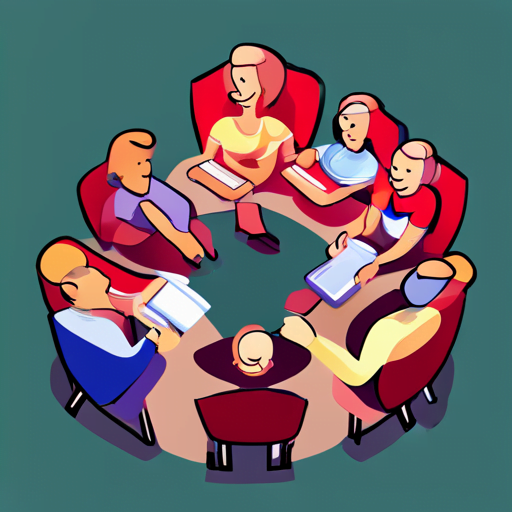Are you looking for a way to combine productivity and fun in your spare time? Joining a reading group might just be the solution you’ve been searching for.
Not only can being a part of a reading group lead to personal growth and new insights, but it can also be an enjoyable social activity. By joining a reading group, you’ll have the chance to engage with others who share your passion for literature.
Collaborating with other readers can lead to lively discussions, new perspectives, and a deeper understanding of the texts you read. Plus, being a part of a reading group can help you stay accountable for your reading goals, ensuring that you stay on track with your personal growth and development.
So why not give it a try? Joining a reading group could be just the boost you need to enhance your reading experience.
Table of Contents
The Benefits of Joining a Reading Group

You’ll love the perks of being part of a book club, from gaining new insights and perspectives to enjoying lively discussions and making new friends. Reading groups offer a great opportunity to read books that you might not have chosen on your own, and to discuss them with other people who share your interests. This can help you to broaden your horizons and learn about new topics, as well as to gain a deeper understanding of books that you already love.
In addition to the intellectual benefits of being part of a book club, there are also social benefits to consider. Reading groups are a great way to meet new people who share your love of literature, and to make connections with others who have similar interests and hobbies.
These groups often meet on a regular basis, which can provide a structured and reliable way to socialize and connect with others. Whether you’re an avid reader or just looking for a fun and engaging way to spend your free time, a reading group can offer a great way to combine intellectual stimulation with social interaction.
Finding the Right Reading Group

Looking for the perfect reading group? Here’s how to find your ideal match.
First, consider your interests and reading preferences. Do you enjoy fiction or non-fiction? Are you interested in a specific genre or topic? Look for reading groups that align with your interests. You can search online for local groups or ask your friends and family if they know of any groups that might be a good fit.
Once you’ve found a few potential groups, attend a meeting or two to get a feel for the group dynamic. Do the members seem friendly and welcoming? Is the discussion engaging and thought-provoking?
It’s important to find a group that you feel comfortable with and that challenges you to think critically about the books you’re reading. Don’t be afraid to try out a few different groups before settling on one that feels like the right fit.
Remember, the goal is to have fun and enhance your reading experience, so take your time and find the group that works best for you.
Preparing for Reading Group Discussions

To make the most out of your reading group discussions, it’s crucial to come prepared with thoughtful insights and questions, as well as an open mind to the diverse perspectives and interpretations of others in the group.
Before each meeting, take the time to read the assigned material thoroughly and take notes on key points, themes, and any questions or observations that come to mind. This will not only help you contribute to the discussion, but also ensure that you’re getting the most out of the reading experience.
In addition to preparing your own thoughts, it’s important to be respectful of others in the group and their perspectives. Avoid dominating the conversation or dismissing someone else’s viewpoint.
Instead, actively listen to others and ask questions to clarify their thoughts and understand their interpretation of the material. By doing so, you’ll not only contribute to a productive discussion, but also have the opportunity to learn from and appreciate the diverse perspectives of others in the group.
Participating in Reading Group Discussions

Joining in on the discussion is a great way to get more out of the material and connect with others who have their own unique perspectives. When participating in a reading group discussion, it’s important to actively listen to what others are saying and contribute your own thoughts and ideas.
Don’t be afraid to ask questions or share your own personal experiences related to the material. This can lead to a more engaging and fruitful discussion for everyone involved.
Another important aspect of participating in a reading group discussion is being respectful of others’ opinions and viewpoints. Avoid interrupting others or dismissing their ideas without giving them a fair chance to explain themselves.
Remember, the goal of the reading group is to have a productive and enjoyable discussion, not to argue or prove someone else wrong. By approaching the discussion with an open mind and a willingness to listen, you can not only enhance your understanding of the material but also build new relationships with fellow readers.
Continuing Personal Growth Beyond the Reading Group

Keep growing beyond the reading group by actively seeking out new perspectives and incorporating them into your daily life.
While participating in reading group discussions can expose you to a wide range of ideas and viewpoints, it’s important to continue your personal growth outside of these meetings.
One way to do this is by regularly engaging with diverse content, whether that be by reading books outside of your usual genre, attending talks on topics that interest you, or following thought leaders on social media.
Additionally, don’t be afraid to challenge your own beliefs and assumptions. It’s easy to fall into a pattern of only seeking out information that confirms what we already believe, but this can limit our growth and understanding of the world.
Instead, actively seek out perspectives that are different from your own and be open to changing your mind.
By continuing to actively pursue personal growth beyond the reading group, you’ll not only broaden your knowledge and understanding, but you’ll also become a more well-rounded and empathetic person.
Frequently Asked Questions
How do reading groups benefit people who struggle with reading or have learning difficulties?
If you struggle with reading or have learning difficulties, joining a reading group can be incredibly beneficial for you. It provides a supportive environment where you can read at your own pace and ask questions without feeling embarrassed.
Being in a group also helps you stay motivated and accountable, as you have others to discuss the book with and share your thoughts and insights.
Additionally, reading groups often choose books that are engaging and enjoyable, making the reading experience more fun and less daunting.
Overall, joining a reading group can help you improve your reading skills, build confidence, and have fun while doing it.
Can reading groups be helpful for people who are not interested in literature or reading as a hobby?
If you’re someone who isn’t interested in literature or reading as a hobby, you might be wondering if reading groups can still be helpful for you. The answer is yes!
Even if you don’t enjoy reading on your own, being part of a reading group can expose you to new ideas and perspectives that you might not have encountered otherwise. Plus, discussing a book with a group of people can be a great way to develop your critical thinking skills and learn how to articulate your thoughts more effectively.
So don’t write off reading groups just because you’re not a bookworm – they can be a valuable tool for personal growth and development for anyone.
How can someone start their own reading group if they can’t find one that fits their interests?
If you can’t seem to find a reading group that suits your interests, why not start your own?
First, decide on a specific theme or genre that you want to focus on, whether it’s science fiction, memoirs, or biographies.
Then, reach out to your friends, coworkers, or local community to see if anyone else is interested in joining.
Once you have a small group established, determine a regular meeting time and location that works for everyone.
Don’t forget to establish some ground rules, such as how often you’ll meet, how many pages to read each week, and how the discussion will be moderated.
With a little planning and effort, starting your own reading group can be a rewarding experience that allows you to delve deeper into your favorite books and connect with like-minded individuals.
Are there any potential downsides or drawbacks to participating in a reading group?
Joining a reading group can be a great way to meet new people, explore new books, and share your thoughts and ideas with others. It can also be a fun and productive way to enhance your reading experience and broaden your perspective.
However, there are potential downsides or drawbacks to participating in a reading group. These include conflicting schedules, disagreements over book selections or interpretations, and pressure to keep up with the group’s reading pace.
Despite these challenges, many people find that the benefits of being part of a reading group far outweigh the drawbacks. They find that the experience can be both intellectually stimulating and socially rewarding.
Can reading groups be a good way to network and make new friends, or are they strictly for discussing literature?
Are you looking for a way to expand your social circle and meet new people? Reading groups could be the perfect solution for you!
Not only do they allow you to discuss literature with like-minded individuals, but they also offer a great opportunity to network and make new friends. By participating in a reading group, you can engage in meaningful conversations, share your thoughts and ideas, and connect with others who share your interests.
So why not give it a try? Join a reading group today and start building new relationships while exploring the world of literature!
Conclusion
So, you’ve learned about the benefits of joining a reading group, how to find the right one, and how to prepare for and participate in group discussions.
But what happens after the reading group is over? The answer is simple: you continue to grow personally and intellectually.
By reading and discussing diverse literature with a group of people, you expand your perspective and gain a deeper understanding of the world around you.
You also have the opportunity to practice your critical thinking and communication skills. And, even after the reading group ends, you can continue to apply these skills in your personal and professional life.
So, don’t hesitate to join a reading group – it’s a win-win for both productivity and fun.
